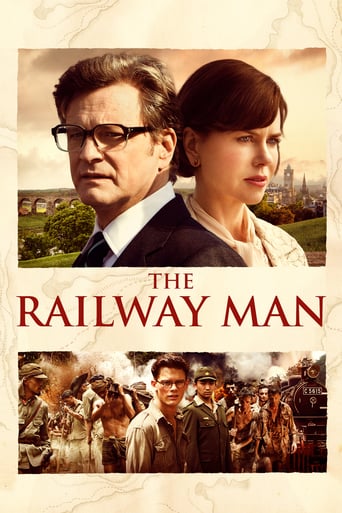thelasttwohundredyears
In 1980, Eric (Colin Firth), traumatized WWII Pacific theatre veteran (and "railway enthusiast"—not "trainspotter") meets, (on a train, of course), long-time nurse Patti (Nicole Kidman). They converse, he about trains, she cattily about her intended travels. Within a few frames, they're married, and she finds out (oh!) that he's haunted by recollections. She can't get to him, so she talks to his wartime fellow prisoner, Finlay (Stellan Skarsgard). Finlay says she should keep to herself, but resolves to do something. Eric returns to the scene of the crime and meets his torturer. Back in England later, he gets a letter from his torturer, and decides to revisit the place, this time with Patti.This is a curiously bloodless film, in the sense of emotionlessness. One could not say that any of the acting performances are poor—Jeremy Irvine, as the young Eric (Firth) is plummily and not entirely annoyingly unwatchable. On a relatively small 18m budget, many scenes and locations are well brought to life. (Truly endless consortiums of taxpayer-funded state and national governments contributed to this film, so if you see this film, no matter how, you paid for it, big time, and the stars and the Weinstein Company got YOUR money, and no lawyer, no matter how expensive, could pretend otherwise.) But the film made back only maybe a quarter, at best, of its expenditure (wonder who got it?). Despite its gold-plated cast, its focus on war and romance and those bankable stars and those nasty enemies (in this case, the Japanese) why?Solipsism, indulgence, and mutual self-admiration. And maybe a story waiting too long to be told.The film is hobbled hopelessly by trying to pack too much in to too short a space. When you consider that this film is about lifelong and never-leaving trauma, the director's decisions to chop it up so close so that so many events happen so quickly over the course of a short-ish film (I saw the American cut), it kind of gives the lie to their noble views about making an important film about a forgotten event that just had to be known about. A bit like saying, "sure it's torture, but you'll get over it"—which is the obverse of the film's lofty purports.Maybe having to get so much public funding—i.e., yours and mine—so that the private sector would at last chip in, took some time. The long gestation and many false starts—these must have contributed to what the film became. Initial enthusiasm can wane and get diluted (or, yes, reanimated sometimes, though not in this case) across time. Who can dislike an economical film? But if you've got the stars, and heaven knows an endless script, let them work with it.Firth openly suggested Kidman, and Irvine, and, who's to say, possibly the international accountants who swung the deal.In the "bonus" material, narrated by the oddly off-pitch and off-styled Lisa Ling, each of the stars engage in talking about just how amazing it was to work with each other. In the commentary with director Jonathan Teplitzky and co-writer/producer Andy Paterson, both emote and slaver over just how amazing each of the scenes were, and just how amazing each of the actors were in being with each other. It only takes a little while of this before your stomach creeps up, and you can't help but think of what this film was supposed to be about, and how this story—any story, got hijacked by self-promoters and moral relativists.Surely this was a story that ought to have been told. But maybe, as for those actually involved, it just had to be gotten over, chalked up to life's enduring inhumanity.The real-life protagonist of the film, Eric Lomax, died shortly before it was released. In the extras, the filmmakers suggest that this was just as well, and as Eric wanted it, and it would have been too much for him to revisit the trauma (rather playing against their own chuffed-up self-imagined achievements).As a war story, this film fails. As a romance, it also fails. As an inward-looking self-congratulatory reel that sucked in public money to make quite a few rich people richer, well, that worked.
bobbyhollywood
In times of war as well as other times, things are done which some do not consider normal, and in their judgments all is not always right. I must give the actors a lot of credit because they filled the characters most adequately, a look here, a step there, in my opinion they each measured what and how they were going to do it to convey the correct thought, and that is one of the important steps in acting.The story was not only compelling for me, but it rivaled many I have seen unfold, and as the others had done, this one had many turning points.Rent, buy or whatever, this is a very good film, and worth the viewing, although, not quite for the faint of heart.











